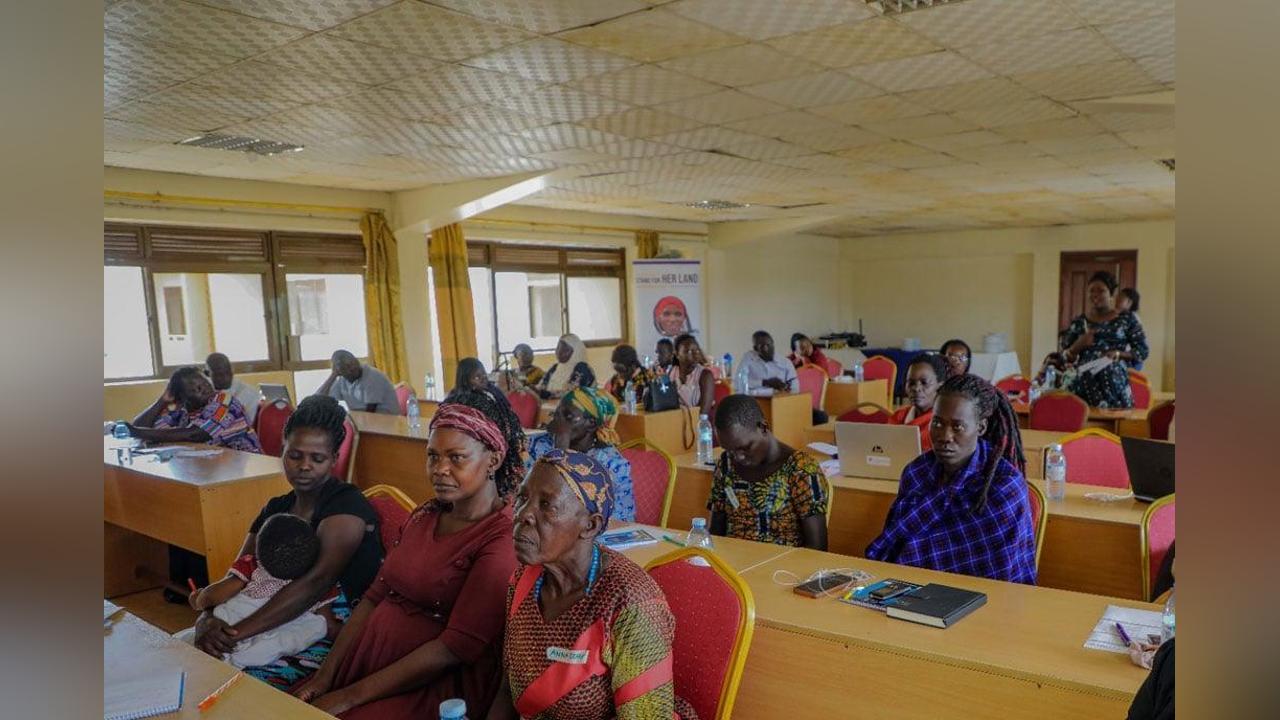Africa-Press – Uganda. Government has been urged to increase funding to the land sector in order to support women’s land rights.
Land and environmental activists say inadequate land sector funding remains a great threat to vulnerable groups like women, who provide 70 per cent of the labour force in the agricultural sector.
In the current Financial Year 2023/24, the allocation for natural resources, environment, climate change, land and water programme saw a significant reduction from Shs635.1billion to Shs417.6 billion, equating to 34.2% decrease.
However, the budget call circular for the FY 2024/25 reveals funding for the programme is set to be increased to Shs1,089.6 billion in the FY 2024/25.
Land Justice Network executive director Rebecca Apio called for “urgency to assess whether this increased funding is sufficient.”
“Land administration institutions remain weak and vulnerable to provide the required safeguards to protect women land rights,” said Apio said.
But the Registrar of Titles at the Lira Ministry Zonal Office, Patience Atuhaire, said they have financial constraints that limit advancing women land rights.
“We do not have a budget line for outreaches. We have projects on customary land but our involvement is minimal in terms of outreach, we only wait when titles are done,” she said at a regional multi-stakeholder budget advocacy dialogue in Lira City last week.
Ritah Kemigisa, the Stand for Her Land Campaign Communications Associate in Uganda, decried challenges faced by her gender due to a dual legal system that blends formal and cultural laws.
“There are gaps on equally progressive laws on marriage, divorce and registration of land in the country,” she said.
Abeja’s case
Janet Abeja’s husband Moses Guna, with whom they had six children abandoned the family for six years. The man also attempted to sell their land measuring approximately 16x37x20x32 metres in Lira City, leaving the woman and her children vulnerable to eviction.
In 2021, Guna resurfaced. This time, not to reunite with the family but to tear it apart.
Abeja told authorities that her “husband sent the area LC1 chairman with a letter to inform her that the developed family land had already been sold off.”
The purported buyer was his mother Beatrice Amongi, according to Daniel Omara Atubo, the former Lands minister, who is currently the Otengoro Olang clan chief.
When the woman refused to vacate the family matrimony home, Abeja’s brother-in-law Charles Ogwal Amute, filed a civil suit at the Magistrate’s Court in Lira against his brother. He accused Guna of selling the land plus three houses on it to their mother and refusing to vacate the property.
PRESS established that Guna did not file a defence nor did he attend any court proceedings, causing court to pass judgment in his absence. The woman and her six children were told to vacate the contested land.
On May 31, 2022, court bailiffs raided the home at Angwetangwet “A” Cell, Boke Ward in Lira City East Division and threw out all occupants plus their few household possessions.
During the eviction, court agents also destroyed household items plus windows and doors.
“After the court agents locked the main house and disappeared, members of the community broke the padlocks and forced the children and their mother back to the house,” locals told.
To date, the woman, who is a prison warder at Lira Prisons, is staying at the disputed home with her children.
Land Justice Network shows that Abeja’s story indicates struggles women face in attaining land justice.
Land rights activists suggest that one way to give women guaranteed land tenure security is land registration and titling.
The Ministry of Lands, Housing and Urban Development has since launched a countrywide land registration initiative aimed at ensuring customary land owners are given certificates of customary ownership to prove land ownership. Under this process, couples are encouraged to jointly register their land.
Lira LC5 chairman Richard Cox Okello Orik is now challenging men to embrace joint registration of land.
“I have got three pieces of land I bought with my money and when it comes to registration, I do it together with my wife because she is my friend,” he said.
However, Tom Odur Anang, a cultural leader and former Kwania County Member of Parliament, said for a married woman, access to land is built on a good relationship with her spouse.”
Traditional gender roles, patriarchal practices, economic and opportunity inequalities to legal limitations, inefficiency of the land registry, and lack of accountability of the land sector, are some of the obstacles said to be blocking women’s advancement in land matters in the country.
Stella Rose Akutui, LANDnet Uganda’s capacity building and networking officer, said there is a need to build the capacity of women on land rights.
“If your land is grabbed and you don’t know anything, you don’t know any procedure, and you don’t know any office… How do you even start? Do you stand a chance to actually gain justice? The answer is No,” she observed.
Lira District Gender officer Ronny Olao urged allocation of more funds to address women matters in land dealings.
Meanwhile, LANDnet has identified community members called champions whom they empowered to address issues of land rights in the communities.
“Champions are like ambassadors. In case anyone has an issue in their community, they can run to that person, who has been trained in the different land laws,” Akutui said.
Source: Monitor
For More News And Analysis About Uganda Follow Africa-Press






